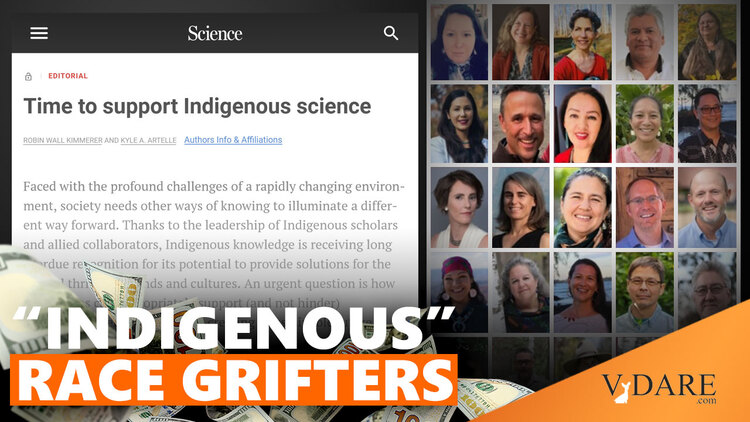
SCIENCE Magazine: Time To Support Indigenous Science
By Steve Sailer
01/22/2024
An editorial in Science, the most famous American scientific journal:
Time to support Indigenous science
ROBIN WALL KIMMERER AND KYLE A. ARTELLE
18 Jan 2024
Vol 383, Issue 6680, p. 243Faced with the profound challenges of a rapidly changing environment, society needs other ways of knowing to illuminate a different way forward. Thanks to the leadership of Indigenous scholars and allied collaborators, Indigenous knowledge is receiving long overdue recognition for its potential to provide solutions for the mutual thriving of lands and cultures. An urgent question is how institutions can appropriately support (and not hinder) Indigenous science’s key role in creating a sustainable future.
After years of marginalization by Western science, regard for Indigenous knowledge is reaching high places. For example, in 2022, the White House called for elevating such knowledge in research, policy, and land management. This is extraordinary given the United States’ track record of attempted erasure of Indigenous thought through policies of removal and forced assimilation.
There is a global groundswell of Indigenous-led research on stewardship of lands and waters, providing opportunities for Indigenous and Western knowledges to flourish together. A major step in this direction was announced last September by the US National Science Foundation, in its establishment of the Center for Braiding Indigenous Knowledges and Science (CBIKS).
Braiding?
Once you start feminizing academia, everything becomes about hair.
Led by a team of 54 predominantly Indigenous scholars and headquartered at the University of Massachusetts, Amherst, CBIKS aims to focus on complex issues at the nexus of nature and culture.
Count the Pretendians:

The guy in the upper right corner looks as BIPOC as all get-out. Also, the next to last guy at the bottom looks indigenous to Aberdeen.
The research teams, which span the globe, will address climate disruption, food insecurity, and cultural survival through learning from Indigenous community-based approaches. The goal is to identify and advance models of ethical and effective integration of Indigenous and Western sciences by creating mutually respectful and reciprocal relationships between them. CBIKS will develop generalizable approaches for a diversity of scientific communities.
… It is crucial that new enthusiasm not take the form of “knowledge mining,” akin to a company suddenly recognizing the value of a previously overlooked mineral, rushing in to extract the ore for its own benefit, and leaving behind toxic tailings. Supporting and engaging Indigenous knowledge first and foremost involves supporting Indigenous communities. Attempts of outside actors to “incorporate” Indigenous knowledge into their own work without full consent of Indigenous communities is highly extractive and undermines the sovereignty of these communities over their own knowledge. Collaborators intent on supporting Indigenous knowledge systems might instead listen, learn, and, if requested, contribute their own knowledge or research resources to communities.
Especially, the contribute resources part.
They might support local governance sovereignty, the return of expropriated land, and the rematriation
Not “repatriation,” but “rematriation.”
of ancestral remains and cultural treasures held in museums, universities, or private collections.
Supporting Indigenous-led research also requires addressing the well-documented institutional barriers that limit full participation and visibility of Indigenous worldviews. Certain embedded protocols may be at odds with Indigenous ethics, values, and processes. For example, Indigenous-led research is supported by environments where the metrics of success not only include the number of scholarly papers published, but also recognize the enhanced well-being of land and culture. Countries must advance policies that support, rather than infringe upon, the wisdom, sovereignty, and rights of Indigenous peoples. To realize the transformative potential of this approach, a climate must be created that values pluralism while protecting sovereignty of diverse knowledges….
In this way, solutions can emerge from the symbiosis between Western and Indigenous knowledges that benefit everyone.
For centuries, Indigenous scientists have had to adapt to, and develop fluency in, Western modes of knowledge making. It’s now Western scientists’ turn to learn from, and respect, Indigenous science.
It would be less destructive if all the race grifters just got their envelopes of cash without requiring that their victims believe in their spiel. You might think that real scientists, surely, can’t fall for the old “indigenous ways of knowing” scam, but if you keep promoting it in Science long enough, eventually enough generations go by that young people don’t know any better.
